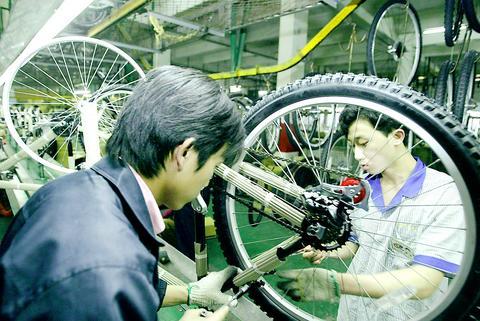In the face of overwhelming competition from Chinese original-equipment manufacturers (OEMs), Taiwanese companies should speed up developing globally recognized brand names to survive, King Liu (
"We started our own brand 18 years ago, when most Taiwanese OEMs were still doing devoted manufacturing," Liu said in a key- note speech to a seminar sponsored by Chinese-language business monthly Common Wealth magazine yesterday.
"But we still feel lonely on this road," he said.

PHOTO: EPA
The nation's top bicycle manufacturer was a key OEM provider for several well-known brands until 1986, when it decided to create its own brand after one of its main foreign clients suddenly shifted orders to another manufacturer.
That crisis forced Giant to remake itself at a time when "made in Taiwan" was a symbol of low-quality products -- but it also proved to be a turning point for the Taichung-based manufacturer, Liu said.
According to international brand consultancy firm Interbrand, Giant has a brand value of US$210 million and ranked as the sixth most valuable brand in the country last year, after Trend Micro, ASUS, Acer, Master Kong and MAXXIS.
Well-known brands make products more marketable, so even when Giant put a US$10,000 price tag on its most luxurious bike, they sold out in a short time, Liu said, adding that the largest benefit of a well-known brand is developing loyal customers who stick to the products.
"When I was in our outlet in Shanghai, a customer told me that Giant bicycles are the most commonly stolen bikes," Liu said, laughing. "Her son has lost seven Giant bikes, yet he still wants a Giant."
Giant has established two manufacturing plants in China since 1993, one in Kunshan, Jiangsu Province, and the other in Pudong near Shanghai.
Even though many local OEMs are aware of the importance of branding after seeing orders being snatched away by cheaper Chinese counterparts, few have taken any practical action and most have just moved their factories to China to save money, Liu said.
"But creating a brand name is the direction to take," he said.
Liu suggested that companies intending to develop their own brands change their company strategy first and work to improve their products on a day-by-day basis to motivate them to innovate.
Eventually, they will come up with unique products, Liu said. Of course, successful products should be combined with good marketing strategies, distribution channels and after-sales service in order to develop a dependable brand, he said.
Liu stressed the importance of the massive Chinese market, saying it is the world's supply hub with companies from all over the world as well as Chinese firms battling to grab a slice of the pie.
Giant sees China as its most important market and it is establishing its third manufacturing plant there in Chengdu, Sichuan Province, in an effort to meet increasing market demand.
"Having our own distinguished brand name is the sharpest weapon [for Taiwanese companies], especially since `made in Taiwan' is now a symbol of higher value-added products," Liu said.

Sweeping policy changes under US Secretary of Health and Human Services Robert F. Kennedy Jr are having a chilling effect on vaccine makers as anti-vaccine rhetoric has turned into concrete changes in inoculation schedules and recommendations, investors and executives said. The administration of US President Donald Trump has in the past year upended vaccine recommendations, with the country last month ending its longstanding guidance that all children receive inoculations against flu, hepatitis A and other diseases. The unprecedented changes have led to diminished vaccine usage, hurt the investment case for some biotechs, and created a drag that would likely dent revenues and

Global semiconductor stocks advanced yesterday, as comments by Nvidia Corp chief executive officer Jensen Huang (黃仁勳) at Davos, Switzerland, helped reinforce investor enthusiasm for artificial intelligence (AI). Samsung Electronics Co gained as much as 5 percent to an all-time high, helping drive South Korea’s benchmark KOSPI above 5,000 for the first time. That came after the Philadelphia Semiconductor Index rose more than 3 percent to a fresh record on Wednesday, with a boost from Nvidia. The gains came amid broad risk-on trade after US President Donald Trump withdrew his threat of tariffs on some European nations over backing for Greenland. Huang further

Macronix International Co (旺宏), the world’s biggest NOR flash memory supplier, yesterday said it would spend NT$22 billion (US$699.1 million) on capacity expansion this year to increase its production of mid-to-low-density memory chips as the world’s major memorychip suppliers are phasing out the market. The company said its planned capital expenditures are about 11 times higher than the NT$1.8 billion it spent on new facilities and equipment last year. A majority of this year’s outlay would be allocated to step up capacity of multi-level cell (MLC) NAND flash memory chips, which are used in embedded multimedia cards (eMMC), a managed

CULPRITS: Factors that affected the slip included falling global crude oil prices, wait-and-see consumer attitudes due to US tariffs and a different Lunar New Year holiday schedule Taiwan’s retail sales ended a nine-year growth streak last year, slipping 0.2 percent from a year earlier as uncertainty over US tariff policies affected demand for durable goods, data released on Friday by the Ministry of Economic Affairs showed. Last year’s retail sales totaled NT$4.84 trillion (US$153.27 billion), down about NT$9.5 billion, or 0.2 percent, from 2024. Despite the decline, the figure was still the second-highest annual sales total on record. Ministry statistics department deputy head Chen Yu-fang (陳玉芳) said sales of cars, motorcycles and related products, which accounted for 17.4 percent of total retail rales last year, fell NT$68.1 billion, or